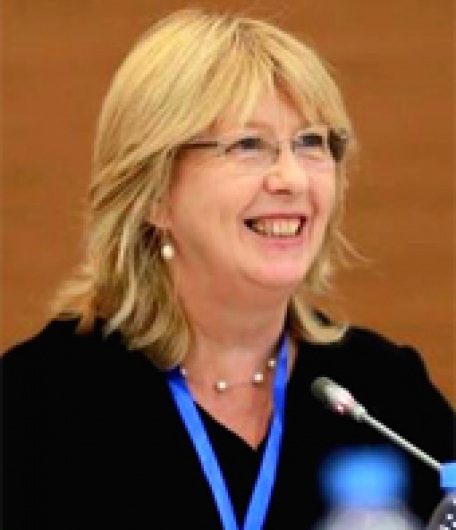Dr Elaine Wilson


Elaine was a secondary school chemistry teacher in Bath and Cambridge and was awarded a Salters' Medal for Chemistry teaching while working at Parkside Community College in Cambridge. Elaine is active in Outreach work with schools and has been a Lead Teacher at Salters' Chemistry Camps.
She has received two career awards for teaching in Higher Education
- 2004 University of Cambridge Pilkington Teaching Prize in recognition of excellence in teaching
- 2004 National Teaching Fellowship in recognition of excellence in teacher education leadership
Elaine teaches Masters students in the Education Leadership for School Improvement route at the Faculty of Education and supervises Doctoral students. Her research interests are in Implementation and Improvement Science, Education Reform and Teacher Education.
Elaine supports the implementation of international teacher reform programmes. Between 2012 - 2016 she developed and supported the implementation of a whole country teacher reform programme in Kazakhstan, more recently she has worked with teachers in India funded by the British Council and has developed a teacher led development programme in Romania funded by the World Bank.
Elaine has advised the Norwegian Research Council since 2017 and collaborates with colleagues in Waseda University in Tokyo.
Books
- Wilson, E. (2012) School-based Research: A Guide for Education Students. 2nd Edition. London, Sage. Watch Podcast
- Warwick, P., Wilson, E., & Winterbottom, M. (2006) Learning and Teaching Primary Science with ICT. Buckingham, Open University Press.
- Wilson, E. (1999) Teaching Chemistry to KS4 - a non-specialist handbook. Hodder and Stoughton, London.
Chapters
- Wilson, E. (2012) Building social capital in teacher education through university–school partnership. In M. Evans, (Ed) (2012) Teacher Education and Pedagogy: theory, policy and practice. Cambridge, Cambridge University Press.
- Demetriou, H., Wilson , E. & Winterbottom, M. (2012) Perfection in teaching...settling for excellence. In M. Evans, (Ed) (2012) Teacher Education and Pedagogy: theory, policy and practice. Cambridge, Cambridge University Press
- Wilson, E. (2012) Action Research, in E Wilson, (Ed) School - based Research, London, Sage
- Wilson, E. (1999) Learning Concepts, in P. Warwick & R. Linfield (eds) Science 3 -13, London, Falmer Press.
- Wilson, E. (1998). Communicating in Science, in E. Bearne, (Ed) The Use of Language at Key Stage 3, London, Routledge.
Journal Articles
Teacher Education
- Wilson, E & Demetriou, H. (2012) Новые знания учителю и обучению Pedagogical Dialogue (1)
- Wilson. E. (2010) Un "nouveau professionnalisme" des enseignants au Royaume-Uni. Former des enseignants (Teacher Training). Revue Internationale d'éducation de Sèvres, Issue 55.
- Wilson, E. & Demetriou, H. (2007) New teacher learning; substantive knowledge and contextual factors.The Curriculum Journal, 18 (3) 213- 229.
Teacher Identity
- Wilson, E. & Deaney, R. (2010) Changing career and changing identity: How do teacher career changers exercise agency in identity construction? Social Psychology of Education,13(2)169 - 183.
Teacher Networks
- Fox, A., Wilson, E. & Deaney, R. (2011) Beginning Teachers’ Workplace Experiences: Perceptions of and Use of Support. Vocations and Learning, 4 (1) 1-24.
- Fox, A., Deaney, R. & Wilson, E. (2010) Examining beginning teachers’ perceptions of workplace support. Journal of Workplace learning, 22 (4), 212-227.
- Fox, A. & Wilson, E. (2009) "Support our networking and help us belong!": listening to beginning secondary school science teachers.Teachers and Teaching: Theory and Practice 15 (6), 701-718
Teacher Motivation, Emotions and Perfectionism
- Demetriou, H. & Wilson, E. (2012) It’s bad to be too good: the perils of striving for perfection in teaching. Procedia - Social and Behavioral Sciences, 46 ,1801 – 1805
- Wilson, E., Demetriou, H. & Winterbottom, M. (2010) Climate change: what needs to be done in order to motivate and sustain new teachers.Science Teacher Education, 57, 34-43.
- Demetriou, H. & Wilson, E. (2009) Synthesising affect and cognition in teaching and learning.
- Social Psychology of Education: an International Journal 12 (2) 213-232
- Demetriou, H. & Wilson, E. (2008) A return to the use of emotion and reflection, The Psychologist, 21 (11)
- Demetriou, H., Wilson, E. & Winterbottom, M. (2009) The role of emotion in teaching: Are there differences between male and female newly qualified teachers' approaches to teaching? Educational Studies, 35 (4) 449-473
Other Studies
- Wilson, E (In press) with Robert Klassen, Angela S. Y. Fiu , Wanwisa Hannok , Marina Wong , and Nongkran Wongsri. Work Stress and Occupational Commitment of Pre-Service Teachers in Four Countries: The Mediating Effect of Self-Efficacy. European Journal of Psychology of Education
- Demetriou, H. & Wilson, E. (2010) Children should be seen and heard: the power of student voice in sustaining new teachers. Improving Schools, 13, 1-16.
- de Winter, J.A., Winterbottom, M. & Wilson, E. 2010. Developing a user guide to integrating new technologies in science teaching and learning: teachers' and pupils' perceptions of affordances. Technology, Pedagogy and Education 19 (2): 261-267.
- Wilson, E (2005) Powerful pedagogical strategies in initial teacher education, Teachers and Teaching; theory and practice, 11 (4)1470-1478
- Wilson, E. (2004) Using activity theory as a lens to analyse interaction in a university - school initial teacher education and training partnership. Educational Action Research, 12(4)587-612.
Other Submissions and Research Reports
- Great teachers:attracting, training and retraining the best . Education Select Committee. April 2012
- Demetriou, H. & Wilson, E. (2010) Student voice revisited: its power in sustaining new teachers. Department for Children, Schools and Families.
- National Network for Science Learning Centres (2010) Excellent and highly effective practice in Initial Teacher Training (ITT) and Early Professional Development (EPD) in secondary science teaching across England. London: Training and Development Agency.
Conference Proceedings
- Wilson , E. (2011) The selective use of teacher education research. Policy in the UK, evidence based or ideologically driven? Teacher Education Policy in Europe, University of Vienna, Austria, 14th May 2011
- Wilson, E. (2010) Beyond Compliance: University-School Network Learning Partnerships. Related Media link
- Teacher Education Policy in Europe, Tallinn University Estonia, 13th September 2010
- Wilson, E. (2009) Using a blended learning approach in a school - university initial teacher education course.
- International Conference on Educational Research for Development, Addis Ababa, Ethiopia, May 2009.
- Fox, A., Deaney, R. & Wilson, E. (2009) Perceptions of the workplace by new teachers, paper presented at the Researching Workplace Learning 6th annual conference, Roskilde University, Copenhagen, 28 June – 3 July 2009.
- Fox, A. & Wilson, E. (2009) Networking for support: learning from the experiences of beginning science teachers, paper presented to the Teacher Education division of the AERA Annual Conference, San Diego, USA, 11-14th April 2009.
- Wilson, E. (2008) Using blended learning in a science education masters course, Proceedings of the International Association for Scientific Knowledge Conference: Teaching and Learning, University of Aveiro, Portugal, 538 - 545.
- McIntyre, J., Hobson, A., Mitchell, N. & Wilson, E. (2008) 'Drinking water in the desert?' Findings from the evaluation of the University of Cambridge early professional development network for beginning teachers. Paper presented at the British Educational Research Association Annual Conference, University of Edinburgh, 3 - 6 September 2008
- Wilson, E. & Demetriou, H. (2006) New teachers' perspectives on their early years of teaching. Paper presented at the British Educational Research Association Annual Conference, University of Warwick, 6-9 September 2006

